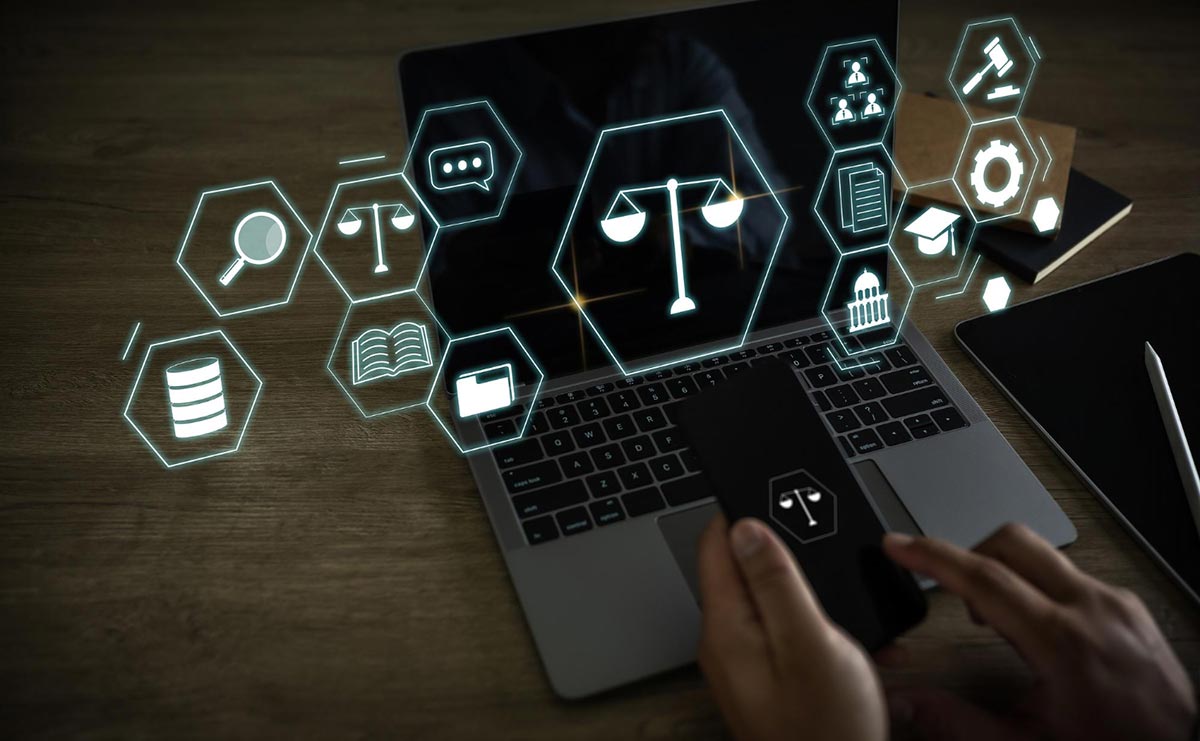Contents
The Genuine Impact of Technology on Legal Profession
Nowadays, the reshaping of old-fashioned methods as a result of the impact of technology is becoming more and more acceptable to law firms and lawyers. It is in fact because of the positive impact of technology in the workplace that has proven itself quite handy and useful to organize tasks more easily and achieve the goals more efficiently, saving energy and time. Moreover, technology in the legal industry improves accuracy as well, the most important thing in providing service for clients from some people’s viewpoint. We will discover the impact of technology on legal professions in this blog to give you a quick understanding of technology and its impacts.
1. Background of the Impact of Technology in Legal Industry
The impact of technology on the legal profession has brought fundamental change, allowing firms to adapt to new demands and client expectations. Historically, law practices relied heavily on manual processes, where document management, client communication, and case tracking were time-consuming tasks. However, with the rise of technology in the legal industry, traditional practices have given way to more streamlined and efficient workflows. Tools like case management and document automation have drastically reduced administrative burdens, freeing up time for legal professionals to focus on client engagement and complex casework.
One of the most significant positive impacts of technology in the workplace is the enhancement of productivity. Legal teams can now utilize case management solutions, such as RunSensible, to manage client intake, automate document processes, and keep track of case progress in a centralized platform. By leveraging these tools, law firms not only improve accuracy and reduce human error but also strengthen data security and client confidentiality—factors critical to trust and compliance in legal practice. Technology-driven solutions thus support law firms in meeting both modern challenges and client expectations more effectively, marking a pivotal shift in the industry’s operations and future trajectory.
2. Positive Impact of Technology in the Workplace for Legal Professionals
The positive impact of technology in the workplace has transformed legal operations, setting a new benchmark for productivity and accuracy. In the past, essential tasks such as document management, client communications, and research involved labor-intensive, manual processes. Today, with advancements in technology in the legal industry, these tasks have become faster, more reliable, and less prone to error. This shift not only boosts internal efficiency but also enhances client satisfaction by streamlining case processing and reducing turnaround times.
Boosting Productivity Through Automation and Streamlined Workflows
One of the most significant ways technology has improved the legal workplace is by introducing automation for repetitive tasks. Solutions like RunSensible allow law firms to streamline client intake, manage case documentation, and handle communications from a single platform. The impact of technology here is clear: less time spent on routine data entry and document preparation means legal professionals can focus on more strategic, high-value activities.

Enhancing Collaboration and Communication
Technology also plays a crucial role in promoting collaboration among legal teams. By centralizing case-related information and offering real-time updates, tools like RunSensible support better alignment and communication across team members. This ensures that everyone involved has access to the latest case details, reducing miscommunication and fostering a more cohesive workflow. Enhanced collaboration, facilitated by technology, ultimately allows legal professionals to deliver more consistent and responsive client service.
3. Key Technologies Shaping the Legal Industry
The impact of technology on the legal industry has ushered in a new era of innovation, reshaping how legal professionals handle cases, interact with clients, and manage firm operations. From artificial intelligence to document automation, these tools are redefining what it means to deliver efficient, effective legal services. By adopting technology that enhances productivity, firms can better meet client needs and operate in a more streamlined manner. Below, we explore several of the key technologies driving this transformation and how they contribute to the positive impact of technology in the workplace for law firms.
Artificial Intelligence and Machine Learning
Artificial intelligence (AI) and machine learning are at the forefront of the technological advancements transforming the legal profession. AI enables law firms to automate complex processes like document review, legal research, and predictive analysis. By employing AI, legal teams can process and analyze massive amounts of information quickly, helping them spot relevant case law, assess trends, and provide more precise guidance to clients. Additionally, RunSensible integrates AI-based features that allow for seamless client intake and efficient document management. This application of AI not only improves accuracy but also significantly reduces the time required for labor-intensive tasks, enhancing the overall impact of technology on legal operations.
Cloud Computing and Data Storage
Cloud computing has transformed data accessibility and security within the legal sector. Traditionally, law firms had to rely on on-premise storage, which limited data accessibility and raised concerns over data loss. Today, with cloud technology, legal professionals can securely store, access, and share documents from virtually anywhere, making collaboration more efficient. For instance, RunSensible’s cloud-based solutions offer firms the ability to securely manage and retrieve client information on demand, regardless of location. This shift to cloud technology in the legal industry has significantly contributed to the positive impact of technology in the workplace, allowing for more flexible, secure, and efficient data handling practices.
Automation in Legal Document Processing
Automation has a direct, transformative effect on document-heavy tasks in law firms, allowing for faster and more accurate completion of documents such as contracts, case filings, and client communications. By automating document generation and review, firms reduce the likelihood of errors and save considerable time. RunSensible’s automated document management features enable legal professionals to draft, edit, and store documents in a centralized system that’s accessible to authorized team members, ensuring accuracy and uniformity. The positive impact of technology in this area is evident, as automation enables lawyers and support staff to minimize repetitive work and focus on tasks that require critical legal expertise.
The influence of these key technologies has been instrumental in driving efficiencies across legal practices. The strategic application of AI, cloud computing, and automation not only enables legal professionals to manage cases more effectively but also fosters a more agile and responsive law firm environment. As technology in the legal industry continues to evolve, the integration of these tools will become increasingly essential for firms aiming to stay competitive and client-focused.
4. The Transformative Role of Technology in Law Firm Operations
The impact of technology on law firm operations has gone beyond efficiency improvements, influencing nearly every aspect of how firms operate and deliver value to clients. As technology continues to advance, law firms are adapting their processes to leverage powerful tools that streamline workflows, enhance client service, and improve accuracy across tasks. The positive impact of technology in the workplace for legal professionals is especially apparent in areas such as case management, financial administration, and data security. Below, we explore how these technology-driven changes are transforming core functions within law firms.
Case Management and Client Intake Solutions
Modern case management and client intake solutions have revolutionized how law firms track and handle cases. Platforms like RunSensible allow firms to integrate client intake, case tracking, and communication into a single, centralized system. This enables legal professionals to easily access client data, view case histories, and monitor case progress in real time. The impact of technology here is substantial, as it reduces administrative burdens and ensures that critical case information is accurate, accessible, and organized. This centralization enhances workflow efficiency, giving legal teams more time to focus on delivering quality legal services and building strong client relationships.
Billing and Financial Management Advances
Billing and financial management are essential yet time-consuming areas within law firms. With the introduction of specialized legal billing software, firms can streamline invoicing, manage trust accounts, and track billable hours with greater accuracy. RunSensible, for example, offers integrated billing and financial management features that help firms automate these processes while ensuring compliance with legal billing standards. The positive impact of technology in this area is clear: by reducing the time spent on manual billing and improving financial accuracy, firms can improve cash flow and reduce the risk of billing disputes with clients.
Enhanced Data Security and Compliance
Data security has become a top priority for law firms, especially as client confidentiality and data protection regulations grow stricter. Technology in the legal industry now includes advanced security measures like encryption, secure cloud storage, and multi-factor authentication to protect sensitive information. RunSensible’s secure, cloud-based platform provides firms with reliable data storage and management capabilities, helping firms meet both ethical and regulatory standards for data protection. This increased security offers peace of mind to clients, while also reducing the risk of costly data breaches. The impact of technology here extends beyond internal benefits, fostering trust with clients and protecting the firm’s reputation.
Through these advancements, technology has transformed not only the daily operations of law firms but also the quality and reliability of their services. Tools like case management software, automated billing systems, and advanced security measures allow legal teams to operate with a level of efficiency, accuracy, and compliance that was once difficult to achieve. As the role of technology in the legal industry continues to expand, firms that embrace these tools will be better positioned to adapt to client demands, regulatory changes, and competitive pressures.
5. Challenges in Adopting Technology in the Legal Industry
While the impact of technology on the legal profession has largely been transformative, the process of adopting new tools and systems also presents significant challenges. Many law firms face obstacles when it comes to implementing and maintaining advanced technologies, from cost and training requirements to ethical concerns and data security. Recognizing and addressing these challenges is essential for firms looking to experience the positive impact of technology in the workplace while staying compliant with regulatory standards and ethical obligations. Below are some of the primary challenges firms encounter in embracing technology in the legal industry.
Addressing Privacy and Ethical Concerns
The shift to technology-driven processes in the legal industry has raised important questions around client confidentiality and data protection. As firms rely more on digital tools, they must carefully manage sensitive client information to avoid ethical violations. For example, the use of cloud storage or client portals, while efficient, requires strict security measures to protect against unauthorized access. Platforms like RunSensible incorporate advanced security features such as data encryption and multi-factor authentication to help firms protect client information. The impact of technology on legal practice can only be positive if firms remain vigilant about meeting ethical obligations related to client privacy and data security.
Bridging the Skills Gap in Technology Use
One of the most pressing issues in adopting technology in the legal industry is the skills gap among legal professionals. Many experienced lawyers and support staff are unfamiliar with new technologies, which can hinder the successful integration of these tools into daily workflows. Training is crucial to ensure that everyone—from senior attorneys to administrative staff—can effectively use case management software, document automation tools, and other systems. RunSensible, for instance, is designed to be intuitive, making it easier for firms to onboard employees and integrate the platform into their operations. Closing the skills gap through training and user-friendly software is key to maximizing the positive impact of technology in the workplace.
Cost and Resource Allocation
The cost of implementing and maintaining advanced technology can be a substantial barrier, particularly for smaller law firms with limited budgets. Investing in reliable technology platforms, data security measures, and ongoing training requires careful resource allocation. However, the long-term benefits, such as increased efficiency and improved client service, often justify these investments. By choosing comprehensive, cost-effective solutions like RunSensible, firms can manage expenses while still benefiting from advanced features such as case management, billing, and client intake automation. Thoughtful investment in technology enables firms to reap significant benefits without straining resources.
Despite these challenges, the advantages of embracing technology in the legal industry are clear. By addressing privacy concerns, bridging the skills gap, and managing costs, law firms can adopt the tools needed to improve productivity and deliver better client service. Firms that strategically overcome these barriers will be well-positioned to leverage the full impact of technology in modernizing their operations and staying competitive in an evolving legal landscape.
6. The Future Impact of Technology in Legal Industry
As technology continues to evolve, the future of the legal industry will be shaped by tools and platforms that empower firms to deliver more efficient, accessible, and client-focused services. The impact of technology on the profession is expected to deepen, influencing everything from case management to client communication and even the fundamental ways in which legal professionals work. By staying ahead of emerging trends, law firms can fully harness the positive impact of technology in the workplace and adapt to shifting industry demands. Below, we explore the potential developments that will shape the future of the legal profession.
Emerging Trends in Legal Tech
Legal technology is advancing at an unprecedented pace, and several trends are set to reshape the landscape of the legal industry. Innovations like artificial intelligence, predictive analytics, and advanced automation are likely to become standard in law firms of all sizes. AI-driven tools, for example, will further streamline legal research, contract review, and litigation analysis, helping legal teams uncover insights faster and more accurately than ever before. RunSensible’s case management platform is already built to integrate with these kinds of advanced technologies, offering firms a competitive edge by providing automated, data-driven insights into case progress and client needs.
Adapting to a Tech-Centric Legal Environment
The increasing prevalence of technology in the legal industry means that firms must be prepared to operate in a highly tech-centric environment. This involves not only adopting new tools but also developing a digital-first culture that emphasizes agility and client responsiveness. A tech-centric approach also requires firms to rethink their operations to maximize the benefits of digital tools. With platforms like RunSensible, legal professionals can manage all aspects of their practice—from client intake to billing—in one cohesive system, enabling a level of adaptability and responsiveness that was previously difficult to achieve. The impact of technology will thus extend beyond tools to influence the very structure and strategy of law firms.
Opportunities for Future Legal Professionals
The future of technology in law opens up unique opportunities for the next generation of legal professionals, who are expected to enter a field vastly different from that of their predecessors. With digital tools becoming an integral part of legal education and training, future attorneys will be well-versed in leveraging technology to enhance their practice. Skills in data analysis, AI tools, and digital communication will likely become as essential as traditional legal competencies. RunSensible’s intuitive, user-friendly platform supports the development of these modern skills, enabling professionals to efficiently manage cases and focus on client-centered tasks. The positive impact of technology in the workplace will not only redefine legal roles but also create a more dynamic, forward-thinking workforce.
As the legal industry embraces these changes, firms that adopt and adapt to technology will be better positioned to meet client needs and remain competitive. The continued impact of technology will drive innovation and efficiency, allowing firms to serve clients with greater precision and speed. Those who embrace these advancements proactively will lead the way in a rapidly evolving legal landscape, turning challenges into opportunities and redefining what it means to deliver excellent legal service.
Embracing the Future: The Lasting Impact of Technology in the Legal Industry
The impact of technology on the legal industry has redefined how law firms operate, manage clients, and achieve results. From automating document processing to enhancing case management, technology enables firms to deliver higher-quality services with precision and efficiency. This positive impact of technology in the workplace isn’t just about efficiency; it’s about empowering legal professionals to focus on client needs, ethical standards, and strategic casework. As firms continue adopting innovative tools, they gain the flexibility and agility necessary to navigate today’s challenges and seize emerging opportunities.
Looking ahead, the transformative power of technology in the legal industry will only increase, with advancements in artificial intelligence, cloud-based solutions, and data security paving the way for even more efficient practices. Firms that stay proactive in adopting technology, particularly comprehensive platforms like RunSensible, will position themselves as leaders in a fast-evolving field. By embracing these tools, legal professionals can build more resilient, client-focused practices that are fully prepared for the demands of tomorrow’s legal landscape.
FAQ
1. How does technology improve efficiency in the legal industry?
Technology streamlines many routine processes in law firms, such as document management, billing, and client intake. With tools like RunSensible, legal professionals can automate repetitive tasks, track cases more easily, and focus more on strategic client work rather than administrative duties.
2. What are the main challenges law firms face when adopting new technology?
Common challenges include data security concerns, the cost of new software, and a skills gap among team members unfamiliar with digital tools. Platforms like RunSensible address these by offering secure, intuitive, and cost-effective solutions that make adoption smoother for firms of all sizes.
3. What is the positive impact of technology in the workplace for legal professionals?
Technology enhances productivity, accuracy, and collaboration among legal teams. For instance, a comprehensive platform like RunSensible allows firms to handle client communications, billing, and case tracking all in one place, leading to fewer errors and a more efficient workplace.
4. How will technology shape the future of the legal profession?
The future of law will be highly tech-driven, with AI, automation, and cloud solutions becoming central to daily operations. Firms that adopt these tools now, using platforms like RunSensible, will stay competitive and responsive to client needs in an evolving legal landscape.
Disclaimer: The content provided on this blog is for informational purposes only and does not constitute legal, financial, or professional advice.







